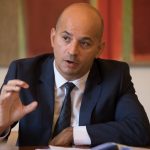Mário Centeno at AmCham – what is he likely to say?
The Governor of the Bank of Portugal, Mário Centeno will be the guest speaker today at a lunch organised by the American Chamber of Commerce in Portugal (AmCham).
But what is he likely to tell the businessmen and women who will gather to hear him speak about the economy and the nation’s finances?
Under a week ago Centeno alerted that Portugal’s debt is “a lot higher” because of the pandemic and government measures to protect jobs and warned that there was “no room for complacency” just because of the good results seen up until now.
However, he is also on record for saying at the online conference Financial Stability that he is confident that the pandemic will be “overcome without permanent damage” adding that the Eurozone will end up with a “much bigger debt”.
“I expect that the economic indicators outlined before the pandemic will be achieved by the end of 2023, which is excellent news and pointed out that the Euro Zone recovered faster than had been expected in the second quarter of 2021, with the hope that the economy would grow rapidly and exceed pre-pandemic amounts by the end of the last quarter”.
The Governor of the Bank of Portugal is earlier this month said in Paris that it was “likely that inflation would slow in 2022” after increasing this year as the ECB points to a 2.2% rate in the Euro Zone for this year.
Mário Centeno pointed out that prices had increased substantially because of rising energy costs with various countries such as Spain and Germany registering inflation rates above 4%.
At the same time he is on record as saying that Portugal will have to “expect a significant slowdown in growth after 2022.
“The challenges of growth that were already there before the crisis will again be evident in the Portuguese economy”, he told journalists on 6 October at a press conference to present the October Economic Bulletin which took place at the Lisbon Money Museum.
Mário Centeno is likely to say that a slowdown in growth from 2022 will happen for two reasons, one of which is that “levels of economic activity will bounce back to levels seen in the pre-pandemic period.
“Then, because of the need to get the economy growing, we will need to reallocate and redeploy resources between sectors. That’s the way economies grow. Therefore, we need to be prepared make this reallocation”, he said.










